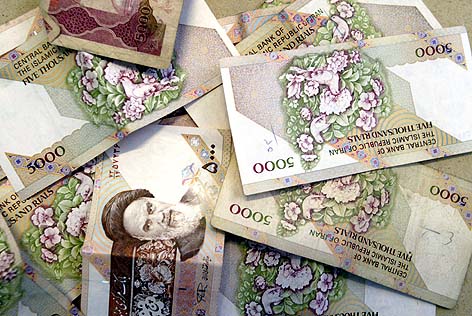 The second round of talks between Iran and the 5+1 Powers (US, UK, France, Germany, China, Russia) on the nuclear programme are now receding. The third, to be held in Moscow, are more than three weeks away.
The second round of talks between Iran and the 5+1 Powers (US, UK, France, Germany, China, Russia) on the nuclear programme are now receding. The third, to be held in Moscow, are more than three weeks away.
So it is now time for the Islamic Republic to put out stories about its economic achievements and success in repelling the aggressive sanctions of the "West". Press TV offers an example:
Japanese Minister of Economy, Trade and Industry Yukio Edano says Tokyo is considering "realistic" options to ensure the country's imports of Iranian crude are not disrupted."We are responding to this [Iran] issue through working with other ministries as a whole," Edano told reporters at a press conference in Tokyo on Friday. He added, "By analyzing various risk factors and overall issues, we would like to ensure crude supplies [from Iran] will not be disrupted in a realistic manner."
Here is what Press TV leaves out --- the already-significant impact of the sanctions on Japanese purchases of Tehran's oil, with the possiblity of more constriction --- from the original report by Platts News Service:
Earlier this month, the Bank of Tokyo-Mitsubishi UFJ, which handles 70-80% of the settlements for Japan's trade with Iran, was reported to have frozen accounts held by Tehran in response to a May 2 order by a New York District Court....
The Japanese government is also considering guaranteeing up to $7.6 billion of insurance cover per tanker for shipments of Iranian crude oil to make up for the potential loss of protection and indemnity cover when European Union sanctions against Iran come into effect in July.
Unsurprisingly, Press TV fails to note that Japan's "imports from Iran have fallen sharply despite an increase in overall oil demand after last year's Fukushima nuclear disaster" and that Minister of Economy Edano said earlier this year that Tokyo's purchases of Iranian oil are down 40% over the last five years.
But Press TV is not alone in its insistence that All Is Well. Former US Government official Flynt Leverett takes up the mission:
Before the nuclear talks started again last month in Istanbul, Tehran calculated that American and European Union sanctions policies created at least as many problems for the United States and Europe as for Iran....The Iranians assess that the Obama Administration has an interest in keeping the negotiations going at least through the U.S. presidential election in November.
It is certainly true that Iran's media outlets and spokesmen like academic Seyed Mohammad Marandi, who often sets the line followed by Leverett, are putting out the message that it is the US and Europe, not the Islamic Republic, who are economically weak --- this, rather than a genuine desire for agreement, is why Washington and allies are pursuing the nuclear talks. However, the argument is propaganda, not assessment, leaving the important question whether the Tehran's officials actually believe the illusions of their rhetoric.
If they do, then they may be in for an awakening as they go to Moscow on 18-19 June. Given the economic difficulties within Iran, which cannot be masked by rose-coloured proclamations, and the European Union's cut-off of Iranian oil imports from 1 July, US and European governments believe they have the upper hand. Having planned for alternative supplies to cover the drop in oil taken from Tehran, they can afford to play the game long. It is far from certain that the Islamic Republic can do so.
Still, there are ripples that could change the scenario. Amid this week's headlines of the nuclear talks, this item has gone almost unnoticed, even by an Iranian media looking for glimmers of good news:
China's imports of Iranian crude oil recovered in April after sharp drops earlier this year, suggesting Beijing remains a steady customer despite U.S. efforts to tighten sanctions on Tehran.
China's April crude imports from Iran, at 1.6 million metric tons or about 390,000 barrels a day, were down almost 24% from a year earlier --- but up more than 48% from March.
Could Beijing offer some release from the economic ties that bind Iran? It is a question such as this, rather than the daily All-Is-Well fare of State media, that will affect the calculations going into the third, perhaps "make-or-break", round of the nuclear talks.
Posted via email from lissping
No comments:
Post a Comment
Note: only a member of this blog may post a comment.